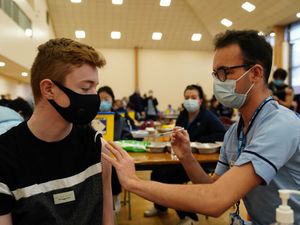Nine in 10 young teenagers in UK likely to have Covid-19 antibodies
The presence of antibodies suggests someone has had the infection in the past or has been vaccinated.

Around nine in 10 young teenagers in the UK are likely to have Covid-19 antibodies, new analysis suggests.
The estimates, which are for children aged 12 to 15, range from 88.0% in Wales to 91.7% in Scotland, with 90.9% in England and 90.7% in Northern Ireland.
It is the first time figures have been published for this age group.
The presence of coronavirus antibodies suggests someone has had the infection in the past or has been vaccinated.
It takes between two and three weeks after infection or vaccination for the body to make enough antibodies to fight the virus.
Antibodies then remain in the blood at low levels, although these levels can decline over time to the point where tests can no longer detect them.
The figures have been calculated by the Office for National Statistics (ONS) and are based on a sample of blood test results for the week beginning January 3 2022.
The very high level of antibodies among young teenagers reflects both the prevalence of coronavirus in this age group in recent months and also the impact of the vaccination programme.
First doses of Covid-19 vaccine have been available for 12 to 15-year-olds since September 2021, with jabs being offered in schools as well as local vaccination centres.
Second doses are now being rolled out to this age group.
The ONS said said there is a “clear pattern” between vaccination and testing positive for Covid-19 antibodies but “the detection of antibodies alone is not a precise measure of the immunity protection given by vaccination”.
A person’s immune response is affected by a number of factors, including health conditions and age.
Antibody levels are expected to decrease over time “irrespective of vaccination or natural infection”, especially when exposure to the virus is reduced, because our bodies stop making antibodies when they are not needed, the ONS added.
Estimates of Covid-19 antibodies for children aged eight to 11 have also been published for the first time.
These are much lower than the estimates for 12 to 15-year-olds, ranging from 37.9% in Northern Ireland to 60.1% in Scotland, with 58.8% in England and 53.3% in Wales.
Only a very small number of children under 12 are likely to have received any Covid-19 vaccine, with the Joint Committee on Vaccination and Immunisation (JCVI) recommending just last month that five to 11-year-olds in clinically vulnerable groups should now be offered two doses, delivered eight weeks apart.
All ONS estimates are for people in private households and are subject to uncertainty, given they are based on samples that are part of the wider population.





